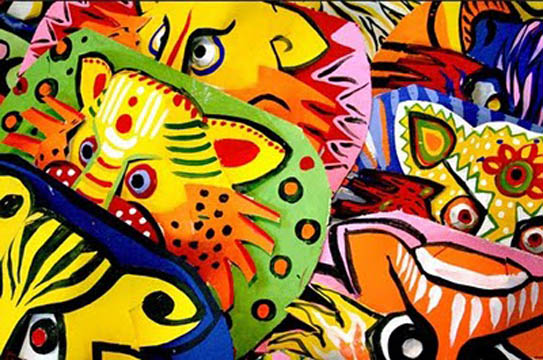
DHAKA, April 13, 2022 (BSS) - The country is set to celebrate Pahela Baishakh, the first day of Bengali New Year-1429, tomorrow upholding the rich cultural values and rituals of the Bangalees.
The Bangla Nabobarsho festival is also going to be celebrated at its traditional venue Ramna Batamul here for the first time after two years due to Covid-19 situation.
This year, the first day of the Bangla calendar, will be celebrated following its all rituals at the venue along with bringing out the traditional Mangal Shovajatra (procession) organized by the Fine Arts Faculty of the Dhaka University.
But, due to the ongoing holy month of Ramadan, it will be celebrated on a limited scale this year.
Dhaka Metropolitan Police Commissioner Shafiqul Islam has said all public events marking Pahela Baishakh must be ended by 2pm tomorrow due to the month of Ramadan.
"Keeping in mind the holy month of Ramadan and traffic jams, all activities for this Bengali New Year and the Pahela Baishakh celebrations will have to be completed by 2 pm and none will be allowed to enter Ramna Park after 1 pm," he said.
Shafiqul made the remarks after inspecting the security arrangements for the Bengali New Year celebrations at Ramna Batamul here on Tuesday.
Besides, no food stalls will remain open on this day as Muslim devotees perform fasting during the holy month of Ramadan.
People are expected to join the "Nabo Barsho" festivities across the country, particularly in the capital city.
Pahela Baishakh is one of the most colourful festivals through which the Bangalees bid farewell to the old year and welcome the New Year.
On this occasion, people from all walks of life wear traditional Bengali dresses.
Young women wear white sarees with red borders and adorn themselves with bangles, flowers, and tips, while men wear white pyjamas and panjabi or kurta.
The government has drawn up an elaborate programme. The Mongol Shovajatra will be brought out at divisional, district and upazila levels to reach the traditional programme to the grassroots as it has earned the international recognition.
However, business communities, especially in the rural areas, are ready to open their traditional 'Halkhata', new account books. On the day traders also offer sweets to customers.
President Abdul Hamid and Prime Minister Sheikh Hasina are expected to issue separate messages greeting the countrymen on the eve of the Pahela Baishakh.
Different government and non-government organisations, socio-cultural platforms, including Bangladesh Shilpakala Academy, Bangladesh Shishu Academy, Bangla Academy, Department of Public Libraries, the National Museum, Kabi Nazrul Institute, Copyright Office, National Book Centre, Bangladesh Small and Cottage Industries Corporation (BSCIC), the Department of Archives and Library and Dhaka University will hold various programmes along with seminars, exhibitions and quiz, essay and art compositions to observe the day.
As part of the Bengali New Year celebrations, Baishakhi rallies will be organized in all districts, upazilas and unions of the country.
Besides, local administration will organize quiz competitions, cultural programmes and folk fairs.
Bangladesh Shilpakala Academy will organize a two-day programme marking the day.
New Year fairs and cultural programmes will be organized by BSCIC on the premises of Bangla Academy and Bangladesh Folk Arts and Crafts Foundation.
The programmes of the day usually begin in the city with the musical soiree of Chhayanat, a leading cultural organisation of the country, at Ramna Batamul at dawn.
However, the Chhayanat is asked to wrap up its celebration programmes by 11 am while the authority concerned are advised to end the fair activities on Ramna premises by 2 pm so that people could go back to their homes or convenient places to have their iftar of Ramadan month.
Bangladesh Television, Bangladesh Betar and private television channels will live broadcast the programmes.
The city people usually start the day with the traditional breakfast of 'panta bhat' (soaked rice), green chili, onion and fried fish at Ramna Park, Suhrawardy Uddyan, Dhaka University Campus, Rabindra Sarobor at Dhanmondi and other amusement places.
But, this year, no food stalls will remain open on this day as it is not permitted.
Graffiti will be painted in the walls signifying the arts, culture and heritage of the country.
Bengali New Year will be celebrated in all educational institutions under their own management in a festive atmosphere while elite city hotels and clubs will host special events and make traditional Bengali food.
On the occasion, all museum and archaeological sites will remain open for all while children, students, people with disabilities and autism will be allowed to visit the museum at free of cost.
Improved traditional food will be distributed to jail inmates, patients in hospitals and orphanages on the occasion.
Bangladesh missions abroad will also organise different programmes to welcome the New Year.
The law enforcement agencies will take extensive security measures across the country so that people could celebrate the day.
The day is a public holiday.
Different national dailies will publish colourful supplements while Bangladesh Television, Bangladesh Betar and other private TV and radio channels will air special programmes highlighting the significance of Pahela Baishakh.
Some historians attribute the Bengali calendar to the 7th century king Shashanka, which was later modified by Mughal emperor Akbar for the purpose of tax collection.
During the Mughal rule, land taxes were collected from Bengali people according to the Islamic Hijri calendar. This calendar was a lunar calendar, and its new year did not coincide with the solar agricultural cycles.
Akbar asked the royal astronomer Fathullah Shirazi to create a new calendar by combining the lunar Islamic calendar and solar Hindu calendar already in use, and this was known as Fasholi shan (harvest calendar).